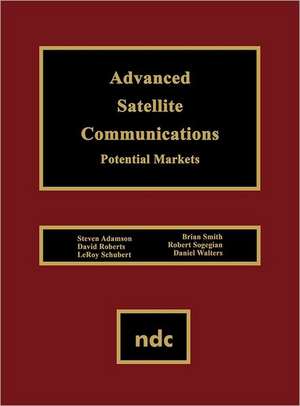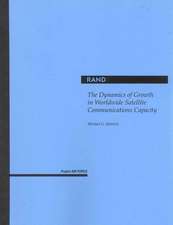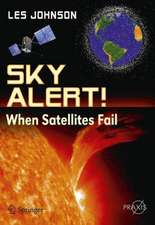Advanced Satellite Communications: Potential Markets
Autor Steven Adamson, David Roberts, LeRoy Schubert, Robert V. Smith, Robert Sogegian, Daniel waltersen Limba Engleză Hardback – 1995
Preț: 463.71 lei
Preț vechi: 602.22 lei
-23% Nou
Puncte Express: 696
Preț estimativ în valută:
88.75€ • 92.30$ • 74.27£
88.75€ • 92.30$ • 74.27£
Carte tipărită la comandă
Livrare economică 15-29 martie
Preluare comenzi: 021 569.72.76
Specificații
ISBN-13: 9780815513599
ISBN-10: 0815513593
Pagini: 372
Dimensiuni: 226 x 288 x 31 mm
Greutate: 1.38 kg
Editura: ELSEVIER SCIENCE
ISBN-10: 0815513593
Pagini: 372
Dimensiuni: 226 x 288 x 31 mm
Greutate: 1.38 kg
Editura: ELSEVIER SCIENCE
Cuprins
1. Introduction
1.1 Background
1.2 Purpose
1.4 Organization
2. General Communications Traffic Types, Volume, and Trends
2.1 Overview
2.1.1 Background
2.1.2 Approach to Projecting the Demand for Telecommunications Traffic
2.1.3 Forecasting Techniques
2.2 Traffic Types
2.3 Voice Traffic
2.3.1 Message Telephone Service
2.3.2 Business Voice
2.3.3 Private Lines
2.3.4 Private Networks
2.3.5 800 Service
2.3.6 900 Service
2.4 Data Traffic
2.4.1 User-Oriented Data Traffic
2.4.2 Business Facsimile
2.4.3 Electronic Mail
2.4.4 Terminal Operations
2.4.5 Application/Industry-Oriented Data Applications
2.4.6 Imaging
2.4.7 On-Line Information Services
2.4.8 Electronic Funds Transfer
2.4.9 Electronic Data Interchange
2.4.10 Research Networks
2.4.11 Data Traffic Summary
2.5 Video Traffic
2.5.1 Video Programming
2.5.2 Network Broadcast
2.5.3 Cable Television
2.5.4 Educational Television
2.5.5 Viewer Choice TV
2.5.6 Business Television
2.5.7 Video Traffic Summary
2.6 Traffic Summary
2.6.1 Summary of Traffic Projections
2.6.2 Busy Hour Analysis
2.6.3 Traffic Projections in Equivalent DSOs
References
3. Telecommunications Infrastructure Status and Plans
3.1 Methodology
3.2 Cable Facilities
3.2.1 Fiber Optic Cable
3.2.2 Fiber Status and Plans
3.2.3 Fiber Optic Technology and Capacity Trends
3.2.4 Fiber Costs
3.3 Coaxial Cable
3.4 Twisted Pair
3.5 Satellites
3.5.1 Geosynchronous Satellite Technology
3.5.2 Geostationary Satellite Status and Plans
3.5.3 GEO Cost to Install
3.5.4 Low Earth Orbit Satellite Technology
3.5.5 Low Earth Orbit Satellite Status and Plans
3.5.6 Low Earth Orbit Satellite Capacity
3.5.7 Low Earth Orbit Satellite Cost to Install
3.6 Very Small Aperture Terminal Technology
3.7 Microwave Radio
3.7.1 Long-Haul·Technology Assessment and History
3.7.2 Long-Haul Status and Plans
3.7.3 Short-Haul Technology
3.7.4 Short-Haul Status and Plans
References
4. Applications
4.1 Methodology
4.2 Broadband Technologies
4.2.1 Frame Relay
4.2.2 Switched Multimegabit Data Service
4.2.3 Broadband ISDN
4.3 Satellite Systems
4.3.1 Very Small Aperture Terminals(VSAT)
4.3.2 Direct Broadcast Satellite
4.4 Integrated Video
4.4.1 Status
4.4.2 Plans
4.4.3 Deployment
4.4.4 Costs
4.4.5 Traffic
4.5 Mobile Satellite Systems
4.5.1 Status
4.5.2 Plans
4.5.3 Deployment
4.5.4 Cost
4.5.5 Traffic
References
5. Satellite-Addressable Markets
5.1 Broadband ISDN
5.1.1 Technical Adequacy
5.1.2 User Acceptance
5.1.3 Competitiveness
5.1.4 Evolution to BISDN
5.1.5 Traffic Estimates
5.2 VSATS
5.2.1 Technical Adequacy
5.2.2 Competitiveness
5.2.3 User Acceptance
5.2.4 Traffic Estimates
5.3 Integrated Video
5.4 Direct Broadcast Satellite
5.4.1 Technical Adequacy
5.4.2 Competitiveness
5.4.3 User Acceptance
5.4.4 Traffic Estimates
5.5 Mobile Satellite Services
5.5.1 Technical Adequacy
5.5.2 Competitiveness
5.5.3 User Acceptance
5.5.4 Traffic Estimates
References
6. VSAT
6.1 VSAT
6.1.1 Models
6.1.2 Results
6.1.3 BISDN Service for Remote Locations
6.2 Broadcasting/Direct Broadcast Satellite
6.2.1 DBS Video
6.2.2 DBS Radio
6.3 Mobile Services
6.3.1 Media Selection Criteria
6.3.2 MSS Application Areas
6.4 Traffic
6.5 Cross Impacts
References
7. Conclusions
7.1 General Communications Traffic Types, Volume, and Trends
7.2 Telecommunications Infrastructure Status and Plans
7.3 Applications
7.4 Satellite-Addressable Markets
7.5 Satellite Capturable Markets
List of Acronyms












